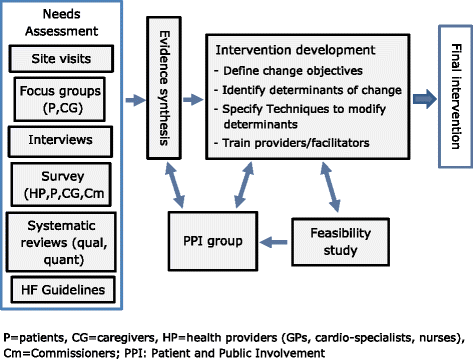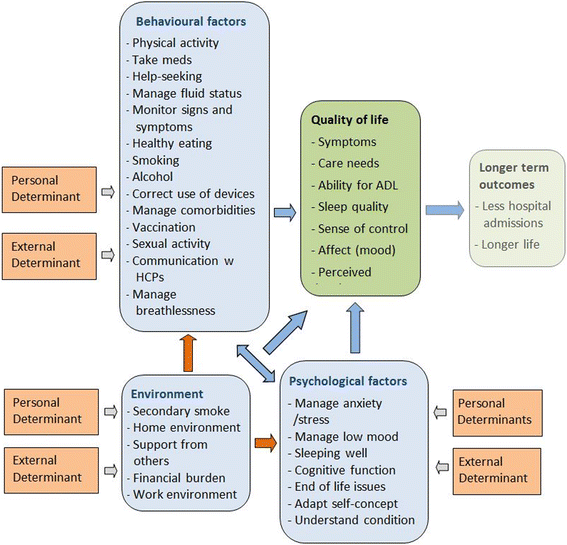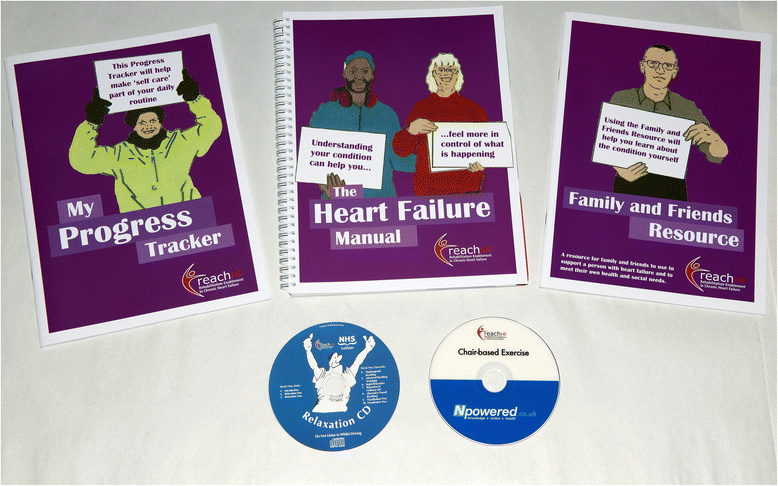Optimising self-care support for people with heart failure and their caregivers: development of the Rehabilitation Enablement in Chronic Heart Failure (REACH-HF) intervention using intervention mapping - PubMed (original) (raw)
doi: 10.1186/s40814-016-0075-x. eCollection 2016.
Jennifer Wingham 2, Carolyn Deighan 3, Patrick Doherty 4, Jennifer Elliott 3, Wendy Armitage 5, Michelle Clark 3, Jackie Austin 6, Charles Abraham 1, Julia Frost 1, Sally Singh 7, Kate Jolly 8, Kevin Paul 9, Louise Taylor 3, Sarah Buckingham 10, Russell Davis 11, Hasnain Dalal 12, Rod S Taylor 1; REACH-HF investigators
Collaborators, Affiliations
- PMID: 27965855
- PMCID: PMC5153822
- DOI: 10.1186/s40814-016-0075-x
Optimising self-care support for people with heart failure and their caregivers: development of the Rehabilitation Enablement in Chronic Heart Failure (REACH-HF) intervention using intervention mapping
Colin J Greaves et al. Pilot Feasibility Stud. 2016.
Abstract
Background: We aimed to establish the support needs of people with heart failure and their caregivers and develop an intervention to improve their health-related quality of life.
Methods: We used intervention mapping to guide the development of our intervention. We identified "targets for change" by synthesising research evidence and international guidelines and consulting with patients, caregivers and health service providers. We then used behaviour change theory, expert opinion and a taxonomy of behaviour change techniques, to identify barriers to and facilitators of change and to match intervention strategies to each target. A patient and public involvement group helped to identify patient and caregiver needs, refine the intervention objectives and strategies and deliver training to the intervention facilitators. A feasibility study (ISRCTN25032672) involving 23 patients, 12 caregivers and seven trained facilitators at four sites assessed the feasibility and acceptability of the intervention and quality of delivery and generated ideas to help refine the intervention.
Results: The Rehabilitation Enablement in Chronic Heart Failure (REACH-HF) intervention is a comprehensive self-care support programme comprising the "Heart Failure Manual", a choice of two exercise programmes for patients, a "Family and Friends Resource" for caregivers, a "Progress Tracker" tool and a facilitator training course. The main targets for change are engaging in exercise training, monitoring for symptom deterioration, managing stress and anxiety, managing medications and understanding heart failure. Secondary targets include managing low mood and smoking cessation. The intervention is facilitated by trained healthcare professionals with specialist cardiac experience over 12 weeks, via home and telephone contacts. The feasibility study found high levels of satisfaction and engagement with the intervention from facilitators, patients and caregivers. Intervention fidelity analysis and stakeholder feedback suggested that there was room for improvement in several areas, especially in terms of addressing caregivers' needs. The REACH-HF materials were revised accordingly.
Conclusions: We have developed a comprehensive, evidence-informed, theoretically driven self-care and rehabilitation intervention that is grounded in the needs of patients and caregivers. A randomised controlled trial is underway to assess the effectiveness and cost-effectiveness of the REACH-HF intervention in people with heart failure and their caregivers.
Keywords: Behaviour change; Heart failure; Intervention mapping; Physical activity; Rehabilitation; Self-care intervention.
Figures
Fig. 1
The intervention development process
Fig. 2
The REACH-HF causal model for the self-management of heart failure
Fig. 3
The REACH-HF intervention materials
Similar articles
- Rehabilitation Enablement in Chronic Heart Failure-a facilitated self-care rehabilitation intervention in patients with heart failure with preserved ejection fraction (REACH-HFpEF) and their caregivers: rationale and protocol for a single-centre pilot randomised controlled trial.
Eyre V, Lang CC, Smith K, Jolly K, Davis R, Hayward C, Wingham J, Abraham C, Green C, Warren FC, Britten N, Greaves CJ, Doherty P, Austin J, Van Lingen R, Singh S, Buckingham S, Paul K, Taylor RS, Dalal HM; REACH-HF investigators. Eyre V, et al. BMJ Open. 2016 Oct 25;6(10):e012853. doi: 10.1136/bmjopen-2016-012853. BMJ Open. 2016. PMID: 27798024 Free PMC article. Clinical Trial. - A facilitated home-based cardiac rehabilitation intervention for people with heart failure and their caregivers: a research programme including the REACH-HF RCT.
Dalal HM, Taylor RS, Wingham J, Greaves CJ, Jolly K, Lang CC, Davis RC, Smith KM, Doherty PJ, Miles J, van Lingen R, Warren FC, Sadler S, Abraham C, Britten N, Frost J, Hillsdon M, Singh S, Hayward C, Eyre V, Paul K. Dalal HM, et al. Southampton (UK): NIHR Journals Library; 2021 Feb. Southampton (UK): NIHR Journals Library; 2021 Feb. PMID: 33617178 Free Books & Documents. Review. - Clinical effectiveness and cost-effectiveness of the Rehabilitation Enablement in Chronic Heart Failure (REACH-HF) facilitated self-care rehabilitation intervention in heart failure patients and caregivers: rationale and protocol for a multicentre randomised controlled trial.
Taylor RS, Hayward C, Eyre V, Austin J, Davies R, Doherty P, Jolly K, Wingham J, Van Lingen R, Abraham C, Green C, Warren FC, Britten N, Greaves CJ, Singh S, Buckingham S, Paul K, Dalal H; REACH-HF Investigators. Taylor RS, et al. BMJ Open. 2015 Dec 23;5(12):e009994. doi: 10.1136/bmjopen-2015-009994. BMJ Open. 2015. PMID: 26700291 Free PMC article. Clinical Trial. - Protocol for an implementation study of an evidence-based home cardiac rehabilitation programme for people with heart failure and their caregivers in Scotland (SCOT:REACH-HF).
Purcell C, Daw P, Kerr C, Cleland J, Cowie A, Dalal HM, Ibbotson T, Murphy C, Taylor R. Purcell C, et al. BMJ Open. 2020 Dec 4;10(12):e040771. doi: 10.1136/bmjopen-2020-040771. BMJ Open. 2020. PMID: 33277287 Free PMC article. - Strategies to enhance routine physical activity in care home residents: the REACH research programme including a cluster feasibility RCT.
Forster A, Godfrey M, Green J, McMaster N, Airlie J, Cundill B, Lawton R, Hawkins R, Hulme C, Birch K, Brown L, Cicero R, Crocker TF, Dawkins B, Ellard DR, Ellwood A, Firth J, Gallagher B, Graham L, Johnson L, Lusambili A, Marti J, McCrorie C, McLellan V, Patel I, Prashar A, Siddiqi N, Trépel D, Wheeler I, Wright A, Young J, Farrin A. Forster A, et al. Southampton (UK): NIHR Journals Library; 2021 Aug. Southampton (UK): NIHR Journals Library; 2021 Aug. PMID: 34432399 Free Books & Documents. Review.
Cited by
- Rehabilitation Enablement in Chronic Heart Failure-a facilitated self-care rehabilitation intervention in patients with heart failure with preserved ejection fraction (REACH-HFpEF) and their caregivers: rationale and protocol for a single-centre pilot randomised controlled trial.
Eyre V, Lang CC, Smith K, Jolly K, Davis R, Hayward C, Wingham J, Abraham C, Green C, Warren FC, Britten N, Greaves CJ, Doherty P, Austin J, Van Lingen R, Singh S, Buckingham S, Paul K, Taylor RS, Dalal HM; REACH-HF investigators. Eyre V, et al. BMJ Open. 2016 Oct 25;6(10):e012853. doi: 10.1136/bmjopen-2016-012853. BMJ Open. 2016. PMID: 27798024 Free PMC article. Clinical Trial. - A randomised controlled trial of a facilitated home-based rehabilitation intervention in patients with heart failure with preserved ejection fraction and their caregivers: the REACH-HFpEF Pilot Study.
Lang CC, Smith K, Wingham J, Eyre V, Greaves CJ, Warren FC, Green C, Jolly K, Davis RC, Doherty PJ, Miles J, Britten N, Abraham C, Van Lingen R, Singh SJ, Paul K, Hillsdon M, Sadler S, Hayward C, Dalal HM, Taylor RS; REACH-HF investigators,. Lang CC, et al. BMJ Open. 2018 Apr 9;8(4):e019649. doi: 10.1136/bmjopen-2017-019649. BMJ Open. 2018. PMID: 29632081 Free PMC article. Clinical Trial. - Process evaluation of a randomised pilot trial of home-based rehabilitation compared to usual care in patients with heart failure with preserved ejection fraction and their caregiver's.
Smith K, Lang C, Wingham J, Frost J, Greaves C, Abraham C, Warren FC, Coyle J, Jolly K, Miles J, Paul K, Doherty PJ, Davies R, Dalal H, Taylor RS; REACH-HF research group. Smith K, et al. Pilot Feasibility Stud. 2021 Jan 6;7(1):11. doi: 10.1186/s40814-020-00747-2. Pilot Feasibility Stud. 2021. PMID: 33407893 Free PMC article. - Protocol update for a multi-centre randomised controlled trial of exercise rehabilitation for people with pulmonary hypertension: the SPHERe trial.
Ennis S, Bruce J, Sandhu H, Ratna M, Lall R, Ji C, Mason J, Kandiyali R, Seers K, Banerjee P, Taylor SJC, Robertson E, Underwood M, McGregor G. Ennis S, et al. Trials. 2024 Jul 20;25(1):495. doi: 10.1186/s13063-024-08341-0. Trials. 2024. PMID: 39033102 Free PMC article. - Disease management interventions for heart failure.
Takeda A, Martin N, Taylor RS, Taylor SJ. Takeda A, et al. Cochrane Database Syst Rev. 2019 Jan 8;1(1):CD002752. doi: 10.1002/14651858.CD002752.pub4. Cochrane Database Syst Rev. 2019. PMID: 30620776 Free PMC article.
References
- Ponikowski P, Anker SD, al Habib KF, et al. Heart failure: preventing disease and death worldwide. ESC Heart Failure. 2014;1:4–25. - PubMed
- McMurray JJ, Adamopoulos S, Anker SD, et al. ESC Guidelines for the diagnosis and treatment of acute and chronic heart failure 2012: The Task Force for the Diagnosis and Treatment of Acute and Chronic Heart Failure 2012 of the European Society of Cardiology. Developed in collaboration with the Heart Failure Association (HFA) of the ESC. Eur Heart J. 2012;33(14):1787–847. doi: 10.1093/eurheartj/ehs104. - DOI - PubMed
- National Institute for Health and Clinical Excellence. Chronic Heart Failure. Management of chronic heart failure in adults in primary and secondary care. NICE Clinical Guideline CG108 2010 https://www.nice.org.uk/guidance/Cg108
LinkOut - more resources
Full Text Sources
Other Literature Sources
Research Materials
Miscellaneous


